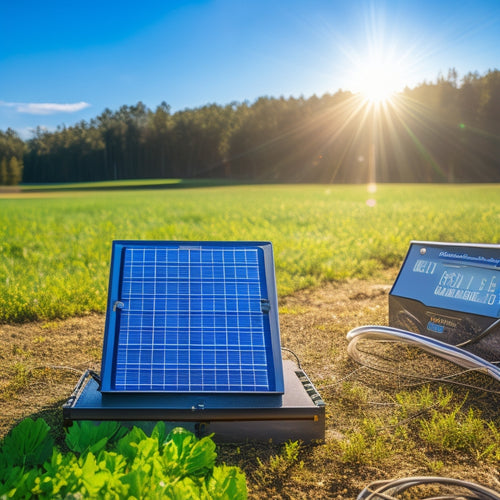
Solar Storage System for Home
Share
By installing a solar storage system, you can increase your property value by up to 17%, making your home more attractive to eco-conscious buyers who are willing to pay a premium for sustainable features. You'll also minimize energy loss and reduce waste, while advanced battery technology and energy management systems optimize power flow. High-efficiency inverters will maximize energy harvest from your solar panels. To get the most out of your system, it's crucial to assess your energy demands and consumption patterns. Now that you've taken the first step, you're ready to investigate the finer details of creating an efficient and cost-effective solar storage system that meets your unique needs.
The Essentials
- Installing a solar storage system can increase your home's value by up to 17% and appeal to eco-conscious buyers.
- Solar storage systems minimize energy loss, optimize power flow, and reduce energy waste, leading to cost savings and grid independence.
- High-efficiency inverters are crucial for optimal energy harvest and conversion, with top-tier models reaching 99% efficiency.
- Understanding your daily energy usage patterns is essential for sizing and optimizing your solar storage system's performance.
- Proper maintenance, such as avoiding extreme temperatures and deep discharges, extends the lifespan of lithium-ion batteries in solar systems.
Boosts Property Value Instantly
By installing a solar storage system in your home, you'll instantly enhance its appeal to potential buyers, making it stand out in a competitive market.
This increased appeal can translate to higher selling prices, as eco-conscious buyers are willing to pay a premium for homes with sustainable features.
In fact, with rooftop solar panels, homeowners can markedly lower their monthly electricity bills harnessing free energy and reduce their carbon footprint.
Studies have shown that homes with solar panels can sell for up to 17% more than similar homes without them.
Increased Property Appeal
Your decision to invest in a solar storage system for your home instantly enhances your property's appeal, making it a highly sought-after asset in the real estate market. This is because environmentally conscious buyers are willing to pay a premium for homes with sustainable features. By installing a solar storage system, you're not only reducing your environmental impact but also increasing your property's desirability.
| Feature | Benefit | Incentive |
|---|---|---|
| Renewable Energy Source | Reduces carbon footprint | Federal and state tax credits |
| Energy Independence | Reduces reliance on grid | Homeowner incentives for off-grid systems |
| Increased Energy Efficiency | Reduces energy bills | Rebates and discounts from utilities |
As a homeowner, you'll enjoy the benefits of reduced energy bills and a clear conscience. Prospective buyers will be attracted to your property's eco-friendly features, making it stand out in a competitive market. By investing in a solar storage system, you're making a smart decision that will pay off in the long run.
Higher Selling Prices
When it comes to selling your home, every detail counts, and a solar storage system can be a major breakthrough. Installing a solar storage system can greatly enhance your property's value, making it more attractive to potential buyers.
With government incentives and financing options available, the initial investment in a solar storage system can be offset, and the long-term savings will be a major selling point. The environmental benefits and energy independence provided by smart technology will also appeal to eco-conscious buyers.
Furthermore, the installation costs and maintenance requirements are decreasing, making solar storage systems more accessible and affordable. Having a reliable Power Outage Protection system in place can also provide an added layer of security and peace of mind for potential buyers.
As the grid reliability becomes a growing concern, having a solar storage system in place will be a major advantage in the future. With the market demand for sustainable homes on the rise, having a solar storage system installed can instantly increase your property's value.
Reduces Energy Waste Significantly
By installing a solar storage system, you'll minimize energy loss and optimize power flow in your home. This means you'll reduce the amount of energy that's wasted during transmission and distribution, making your energy usage more efficient.
With a residential energy storage system, you can store excess energy generated by your solar panels during the day for use during outages and off-peak hours home solar battery cost. This not only reduces your reliance on the grid but also lowers your energy bills.
With optimized power flow, you'll get the most out of your solar energy system, reducing your reliance on the grid and your energy bills.
Minimize Energy Loss
Optimizing energy storage and consumption is essential in a solar-powered home, and a well-designed solar storage system minimizes energy loss, thereby reducing energy waste considerably.
By integrating advanced battery technology with your solar integration system, you can maximize energy efficiency and reduce your reliance on the grid. This not only leads to significant cost savings but also promotes sustainability practices and helps you achieve grid independence.
A well-planned energy management system guarantees that your home automation system is optimized to prioritize energy efficiency. This means that you can automate energy-intensive tasks during off-peak hours, reducing energy waste and saving you money.
With a solar storage system, you can store excess energy generated during the day for use during the night or on cloudy days, reducing your reliance on non-renewable resources. By minimizing energy loss, you can enjoy the benefits of renewable resources while maintaining a high degree of energy independence.
With the right storage solutions in place, you can rest assured that your energy needs are met while promoting a more sustainable future.
Optimized Power Flow
You can greatly reduce energy waste with an optimized power flow system, which guarantees that your solar storage system operates at peak efficiency. This advanced technology enables seamless integration with the smart grid, ensuring a reliable and efficient flow of renewable energy into your home.
By optimizing power flow, you can achieve true energy independence, reducing your reliance on the grid and minimizing your environmental impact.
An optimized power flow system also enables advanced load management and demand response capabilities, allowing you to store excess energy generated during the day for use during peak hours. This not only reduces energy waste but also provides significant cost savings.
The latest battery technology plays an essential role in this process, ensuring that your energy storage system operates at maximum efficiency.
With optimized power flow, you can enjoy enhanced energy resilience and reduced energy waste, resulting in a more sustainable and environmentally friendly home.
Inverter Efficiency Matters Most
You'll find that an inverter's efficiency plays a critical role in your solar storage system's overall performance, especially when it comes to off-grid power and energy storage systems.
To maximize your energy harvest, you need an inverter that can achieve peak power conversion, ensuring that every watt of sunlight is converted into usable electricity.
This is particularly important for homeowners who rely on renewable energy battery banks and deep cycle battery systems.
Look for an inverter with peak efficiency ratings to minimize energy losses and get the most out of your solar investment.
Optimal Power Conversion
During peak sun hours, your solar panels generate a DC power surge, but your home appliances and the grid require AC power to function. This is where ideal power conversion comes into play.
Your inverter's efficiency is vital in converting DC power to AC, guaranteeing you maximize your energy independence. A high-efficiency inverter minimizes energy losses, allowing you to power your home and store excess energy for later use.
Effective power management is fundamental to achieving ideal power conversion. A good inverter should be able to handle the variable output of your solar panels, converting it to a stable AC output that meets the grid's requirements.
Look for an inverter with a high maximum power point tracking (MPPT) efficiency, which ensures that your system operates at its maximum potential. By choosing an inverter with ideal power conversion capabilities, you'll be able to enjoy the freedom and flexibility that comes with generating your own clean energy.
Peak Efficiency Ratings
Peak Efficiency Ratings
Typically, peak efficiency ratings for inverters range from 95% to 98%, with top-tier models boasting efficiencies as high as 99%. When selecting an inverter for your solar storage system, you'll want to prioritize peak efficiency to maximize your energy harvest.
A highly efficient inverter guarantees that more of the energy generated by your solar panels is converted into usable power for your home. This is especially important when integrating your solar panel system with energy storage, as efficient energy conversion can greatly impact your overall energy management.
You'll want to look for inverters with high peak efficiency ratings to minimize energy losses during conversion. This is essential when you're relying on your solar storage system to power your home, especially during periods of low sunlight or high energy demand.
Assess Your Energy Demands
You need to understand your daily energy usage patterns to determine how much power your solar storage system should provide. This involves tracking your energy consumption breakdown, including the time of day you use the most energy and which appliances consume the most power.
For instance, homeowners with off grid solar battery systems may prioritize storing excess energy generated during the day for nighttime use. By analyzing this data, you can accurately size your solar storage system to meet your specific energy demands.
Daily Energy Usage Patterns
Evaluating your energy demands involves understanding your daily energy usage patterns, which vary considerably depending on your lifestyle and the number of occupants in your home.
To get a clear depiction, you'll need to monitor your energy usage over a period of time. This can be done using energy monitoring devices that track your energy consumption in real-time. By analyzing this data, you'll be able to identify patterns and trends in your energy usage, such as peak hours, daily averages, and seasonal fluctuations.
Usage forecasting is another vital aspect of understanding your daily energy usage patterns. By analyzing historical data, you can predict your future energy needs and adjust your energy storage system accordingly.
This guarantees that you have a reliable source of energy when you need it most. By understanding your daily energy usage patterns, you can optimize your solar storage system to provide you with the freedom and independence you desire.
With accurate forecasting, you can avoid energy shortages, reduce your reliance on the grid, and enjoy a more sustainable lifestyle.
Energy Consumption Breakdown
During the assessment of your energy demands, an essential step involves breaking down your energy consumption into its constituent parts. This breakdown allows you to identify the areas where energy is being wasted and opportunities for improvement.
By analyzing your energy consumption breakdown, you can pinpoint the specific energy sources that are driving your consumption habits. For instance, you may find that your refrigerator is the largest consumer of energy in your home, followed by your air conditioner and lighting systems.
Knowing this, you can start making informed decisions about how to optimize your energy usage. You can consider upgrading to energy-efficient appliances, installing energy-saving light bulbs, and adjusting your thermostat to reduce energy waste.
A detailed energy consumption breakdown also helps you determine the size of the solar storage system you need to meet your energy demands. By understanding your energy consumption patterns, you can design a solar storage system that provides you with the freedom to generate and store your own energy, reducing your reliance on the grid and saving you money on your energy bills.
Lithium-Ion Battery Durability
You'll want to contemplate a lithium-ion battery's cycle life when evaluating its durability.
This metric measures how many charge/discharge cycles a battery can handle before its capacity degrades to 80% of its initial value.
A higher cycle life means your solar storage system will provide reliable power for a longer period.
Battery Cycle Life
About 3,000 to 5,000 charge cycles are typically guaranteed by manufacturers for lithium-ion batteries in solar storage systems. This means you can expect your battery to last for a significant amount of time, providing you with a reliable source of energy.
However, it's crucial to understand that battery cycle life isn't a fixed number, and it can vary depending on several factors, such as charging patterns, depth of discharge, and environmental conditions.
To maximize your battery's lifespan, you'll need to guarantee proper battery maintenance. This includes avoiding extreme temperatures, keeping the battery charged between 20% and 80% if possible, and minimizing deep discharges.
By following these guidelines, you can help extend the life of your battery and get the most out of your solar storage system.
It's also important to monitor your battery's charging cycles and adjust your usage habits accordingly. By doing so, you can optimize your energy consumption and reduce wear and tear on your battery.
With proper care and maintenance, your lithium-ion battery can provide you with a reliable source of energy for years to come.
Frequently Asked Questions
Can I Use a Solar Storage System With My Existing Solar Panels?
You can definitely employ a solar storage system with your existing solar panels, achieving seamless battery integration and energy independence.
How Long Does It Take to Install a Solar Storage System?
You'll typically spend 1-3 days on the installation process, depending on the complexity of your setup. The installation timeline includes evaluating your electrical panel, installing the storage system, and integrating it with your existing infrastructure.
Are Solar Storage Systems Compatible With Grid-Tied Systems?
You'll find that many solar storage systems seamlessly integrate with grid-tied systems, thanks to advanced battery integration and energy management capabilities, allowing you to optimize your energy usage and enjoy greater independence from the grid.
Can I Charge My Electric Vehicle With a Solar Storage System?
As you cruise into the driveway, imagine utilizing the sun's energy to fuel your electric vehicle; with solar charging, you'll gain EV benefits like reduced emissions and lower operating costs, giving you the freedom to roam guilt-free.
Do Solar Storage Systems Require Regular Maintenance?
You'll want to perform regular maintenance on your solar storage system to guarantee peak performance and extend battery lifespan. Follow these maintenance tips: check battery health, update software, and clean connections to keep your system running smoothly.
Final Thoughts
By investing in a solar storage system for your home, you'll not only increase your property value and reduce energy waste, but also enjoy a more sustainable future. Did you know that in 2020, solar batteries helped homeowners save over 1.4 billion kilowatt-hours of energy in the US alone? With the right inverter efficiency, assessment of your energy demands, and durable lithium-ion batteries, you'll be part of this growing movement. Make the smart switch to solar storage today.
Related Posts
-

Solar Phone Chargers for Camping Essentials
Solar phone chargers are must-haves for your camping essentials, allowing you to stay connected while enjoying nature...
-

Top Portable Refrigerators for Camping Adventures
When you're camping, having a reliable portable refrigerator can make all the difference for keeping your food fresh ...
-

Choosing the Right Solar Power Charge Controller
Choosing the right solar power charge controller is crucial for maximizing energy efficiency and extending battery li...


